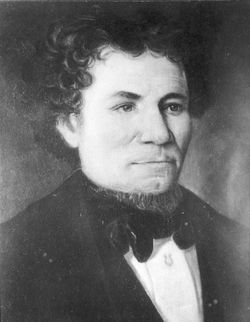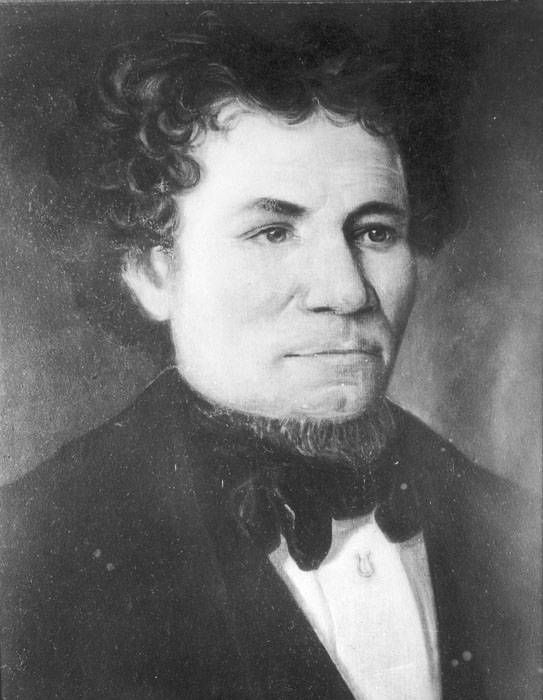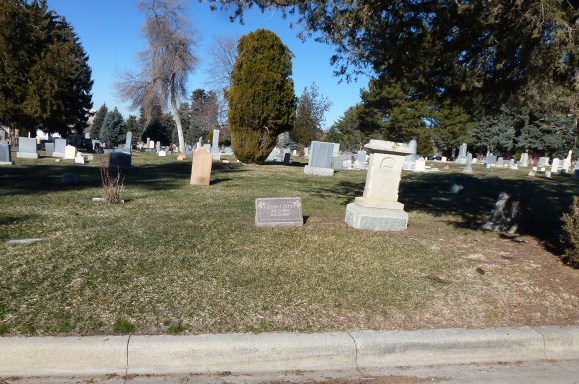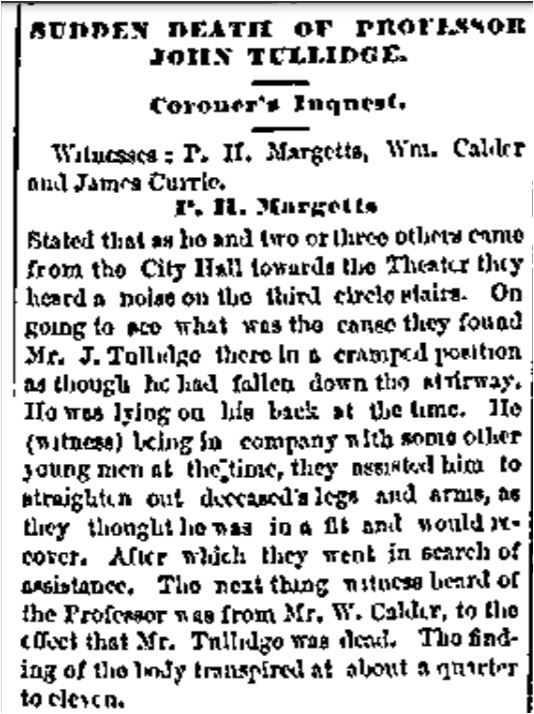Children - Edward William Tullidge, Mary Elizabeth Tullidge, Jane Puckett Tullidge, John Tullidge, Charles Frederick Tullidge
Evidence from emigration and church records (Perpetual Emigrating Fund) prove the Tullidge family traveled to Utah in 1863. They may have traveled in the John W. Woolley Company with their son, John. It is also possible they may have been in Daniel D. McArthur's company as Tullidge later said he arrived on 3 October (the date of the McArthur company's arrival). Company Unknown (1863); Age at Departure: 56
John Elliott Tullidge was one of a group of early musicians that exerted a considerable influence on the culture of Utah. He was a gentleman, well-trained in the musical arts, and intensely proud of his profession. He left his testimony in many songs that have been used in the church. His gift to his posterity was one song, "An Angel From on High", and another "Think Not When We Gather", as well as "Come, All Ye Saints of Zion".
Son of Edward Tullidge and Mary Elliot. Edward Tullidge was 6 feet tall and had a very commanding appearance. He was quite religious and was a devout Methodist. He was born at Checkerel near Weymouth in 1757 and died at Weymouth in 1844, age 87. He was described as a gentleman shoemaker. That means, he had a large shoe shop and hired a number of men to make shoes for sale. Grandfather Tullidge only had one sister, Rottor, who lived at Checkeral, Dorset, England. Mary Elliot Tullidge, was born in Portland, an island near Weymouth, in the year 1765, and died at Weymouth on the 25th day of June, 1825, at age 60. Edward and Mary Elliott had three sons and one daughter; the daughter died very young.
History - John Tullidge was born in 1806, the son of Edward and Mary Elliott Tullidge. His father, being a wealthy man, gave his son every advantage. At the age of 3 years, showing signs of a very remarkable voice and a love for music, he was placed under the care of a tutor. At the age of 10 years he led the choir at a concert in London. He received his education at Eton and at the same time studied voice culture. Later he studied composition and technique under the celebrated musician and composer Hamilton.
At the age of twenty he married Elizabeth Daw, granddaughter of Squire Horsey, a wealthy landowner of Brighton. Five children were born to them, three sons and two daughters the youngest son dying when a child.
In his youth Professor Tullidge won the position as the principal tenor of the Philharmonic concerts and he became one of the four conductors of the York Harmonic Society. Mrs. Sunderland, known as the "Yorkshire Queen of Song" and later as the greatest oratorio singer in England, was at that time the leading soprano of the society. Mr. Tullidge was frequently sent out along with her to fill an engagement as the principal concert singers in the Northern countries of England. It was one of these professional tours that led him into Wales, where he became the conductor of St. Mary's Cathedral choir of Newport, South Wales. Tullidge was founder of the Newport Harmonic Society in 1843. This same organiztion, years later, took the laurels from the choral societies of all England and to this day this choral society is known by the same name, and has never ceased to be active.
In 1836 he was invited to spend the Christmas holidays at Lord Reynolds' castle. It was there he sang for Princess Victoria, who became Queen of England the following year.
In 1850, Professor Tullidge returned to Weymouth, and about a year later, his son Edward (the Utah historian) was converted to the Mormon Church by William Bowring, a distant relative of Sir Henry Bowring, his mother's cousin. Edward was a traveling Elder for seven years, only coming home long enough to get clothes and some much-needed food. It was during these brief visits that he converted his sisters and brother.
In 1855 Professor Tullidge and his family moved to Liverpool where Edward became editor of the Millennial Star. In 1860 his daughters, Elizabeth and Jane, sailed for America, and in 1861 Edward followed them.
It was in the Spring of 1863 that Professor Tullidge and his wife decided to make the long trek to Utah. His son John Elliott, Jr. and his wife and infant daughter emigrated with them. The child died and was buried on the plains. They arrived in the valley in Sept. 1865. Professor Tullidge did not join the Mormon church until a year after he arrived in Utah and his wife, Elizabeth, never joined the Church. Her family had always been Episcopalians and the Gospel coming to her later in her life, as it did, she was unable to make the change.
Professor Tullidge gave his first concert in Salt Lake City in September 1864. He was the first music critic in Utah. In addition to these duties, he also gave concerts and taught music and composition and arranged musical scores for the Salt Lake Theatre orchestra.
At the time of his death in 1874, he was composing music for the Salt Lake Theatre, when he fell down a flight of stairs striking his head which killed him instantly.
The preparation of this story is from the article "The Story of Our Hymns" by Diane Ellison.
*John Tullidge was not given a middle name at his birth. When he was older, John chose Elliott to use as his middle name.
Children - Edward William Tullidge, Mary Elizabeth Tullidge, Jane Puckett Tullidge, John Tullidge, Charles Frederick Tullidge
Evidence from emigration and church records (Perpetual Emigrating Fund) prove the Tullidge family traveled to Utah in 1863. They may have traveled in the John W. Woolley Company with their son, John. It is also possible they may have been in Daniel D. McArthur's company as Tullidge later said he arrived on 3 October (the date of the McArthur company's arrival). Company Unknown (1863); Age at Departure: 56
John Elliott Tullidge was one of a group of early musicians that exerted a considerable influence on the culture of Utah. He was a gentleman, well-trained in the musical arts, and intensely proud of his profession. He left his testimony in many songs that have been used in the church. His gift to his posterity was one song, "An Angel From on High", and another "Think Not When We Gather", as well as "Come, All Ye Saints of Zion".
Son of Edward Tullidge and Mary Elliot. Edward Tullidge was 6 feet tall and had a very commanding appearance. He was quite religious and was a devout Methodist. He was born at Checkerel near Weymouth in 1757 and died at Weymouth in 1844, age 87. He was described as a gentleman shoemaker. That means, he had a large shoe shop and hired a number of men to make shoes for sale. Grandfather Tullidge only had one sister, Rottor, who lived at Checkeral, Dorset, England. Mary Elliot Tullidge, was born in Portland, an island near Weymouth, in the year 1765, and died at Weymouth on the 25th day of June, 1825, at age 60. Edward and Mary Elliott had three sons and one daughter; the daughter died very young.
History - John Tullidge was born in 1806, the son of Edward and Mary Elliott Tullidge. His father, being a wealthy man, gave his son every advantage. At the age of 3 years, showing signs of a very remarkable voice and a love for music, he was placed under the care of a tutor. At the age of 10 years he led the choir at a concert in London. He received his education at Eton and at the same time studied voice culture. Later he studied composition and technique under the celebrated musician and composer Hamilton.
At the age of twenty he married Elizabeth Daw, granddaughter of Squire Horsey, a wealthy landowner of Brighton. Five children were born to them, three sons and two daughters the youngest son dying when a child.
In his youth Professor Tullidge won the position as the principal tenor of the Philharmonic concerts and he became one of the four conductors of the York Harmonic Society. Mrs. Sunderland, known as the "Yorkshire Queen of Song" and later as the greatest oratorio singer in England, was at that time the leading soprano of the society. Mr. Tullidge was frequently sent out along with her to fill an engagement as the principal concert singers in the Northern countries of England. It was one of these professional tours that led him into Wales, where he became the conductor of St. Mary's Cathedral choir of Newport, South Wales. Tullidge was founder of the Newport Harmonic Society in 1843. This same organiztion, years later, took the laurels from the choral societies of all England and to this day this choral society is known by the same name, and has never ceased to be active.
In 1836 he was invited to spend the Christmas holidays at Lord Reynolds' castle. It was there he sang for Princess Victoria, who became Queen of England the following year.
In 1850, Professor Tullidge returned to Weymouth, and about a year later, his son Edward (the Utah historian) was converted to the Mormon Church by William Bowring, a distant relative of Sir Henry Bowring, his mother's cousin. Edward was a traveling Elder for seven years, only coming home long enough to get clothes and some much-needed food. It was during these brief visits that he converted his sisters and brother.
In 1855 Professor Tullidge and his family moved to Liverpool where Edward became editor of the Millennial Star. In 1860 his daughters, Elizabeth and Jane, sailed for America, and in 1861 Edward followed them.
It was in the Spring of 1863 that Professor Tullidge and his wife decided to make the long trek to Utah. His son John Elliott, Jr. and his wife and infant daughter emigrated with them. The child died and was buried on the plains. They arrived in the valley in Sept. 1865. Professor Tullidge did not join the Mormon church until a year after he arrived in Utah and his wife, Elizabeth, never joined the Church. Her family had always been Episcopalians and the Gospel coming to her later in her life, as it did, she was unable to make the change.
Professor Tullidge gave his first concert in Salt Lake City in September 1864. He was the first music critic in Utah. In addition to these duties, he also gave concerts and taught music and composition and arranged musical scores for the Salt Lake Theatre orchestra.
At the time of his death in 1874, he was composing music for the Salt Lake Theatre, when he fell down a flight of stairs striking his head which killed him instantly.
The preparation of this story is from the article "The Story of Our Hymns" by Diane Ellison.
*John Tullidge was not given a middle name at his birth. When he was older, John chose Elliott to use as his middle name.
Family Members
Advertisement
Advertisement













